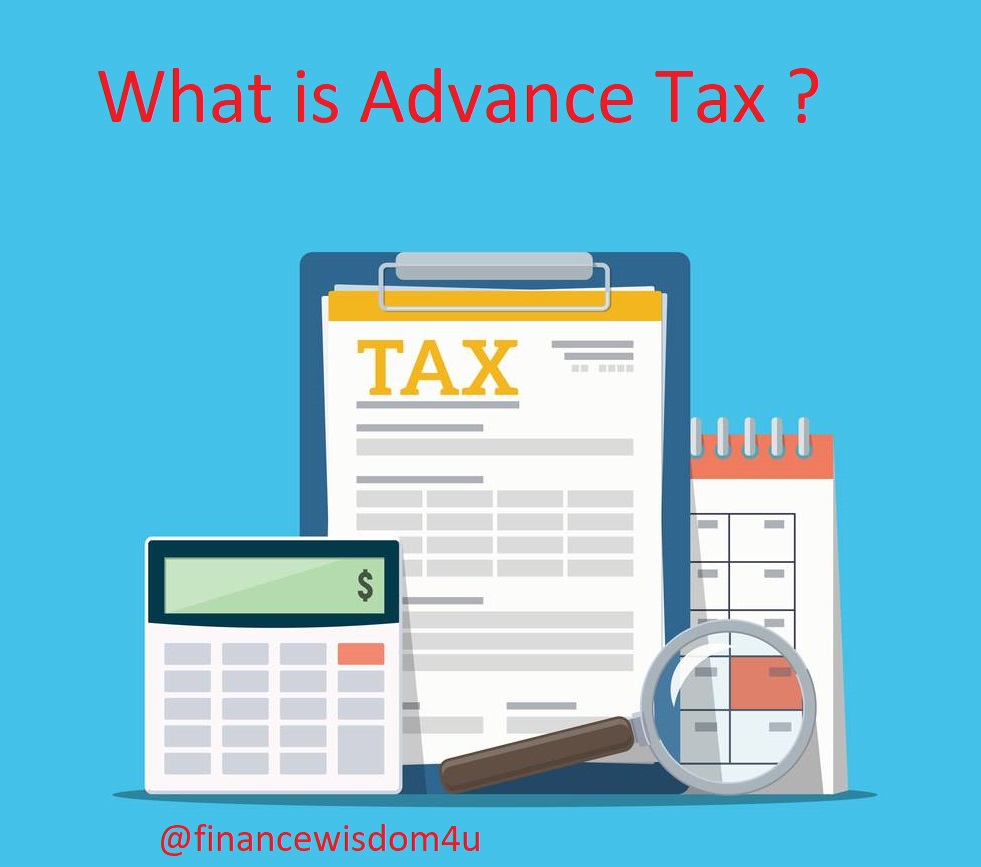Advance Tax – Introduction
Advance Tax is an essential aspect of income taxation that often perplexes individuals who derive income from sources other than their salaries. In simple terms Advance-Tax is the income tax paid by an individual on income earned beyond their salary, encompassing areas such as rental income, capital gains, fixed deposits, dividends and more. It becomes applicable when an individual’s net tax liability exceeds ₹1,000 and this tax is paid during the financial year instead of the assessment year. TDS is separate and different than Advance Tax and it is explained in our previous blog. As a promise from financewisdom4u to educate everyone in financial literacy.
Advance Tax is an income tax paid by the individual on the income earned apart from salary income like rental income, capital gain, fixed deposits, dividend, etc if the net tax liability on the individual is more that ₹1,000. This tax is paid during the financial year instead of the assessment year.

Explaining Advance Tax
To comprehend Advance Tax better, let’s break down the concept into simpler components. Essentially the income we earn is subject to taxation and this process is usually carried out in the assessment year. However for those with incomes outside of their salary the government has implemented the Advance Tax system to ensure a more timely collection of taxes.
Advance-Tax is not a separate tax; rather it is a method of paying one’s income tax liability in installments throughout the financial year. This approach helps the government in avoiding a lump-sum payment at the end of the assessment year and ensures a steady inflow of revenue.
Who Needs to Pay Advance Tax?
Individuals whose primary source of income is not a salary such as freelancers, business owners, professionals and those earning from investments need to pay. If the total tax liability after considering TDS (Tax Deducted at Source) and other deductions exceeds ₹1,000 then the taxpayer is obligated to pay Advance Tax.
Calculating Advance Tax with example
The calculation involves estimating the total income for the financial year and determining the tax liability on that income. The taxpayer can deduct TDS and other applicable deductions to arrive at the net tax liability. If the net tax liability is more than ₹1,000 Advance Tax is due.
Example
Let’s consider an example to illustrate how it is calculated:
Suppose Mr. A is a freelance graphic designer with an estimated annual income of ₹6,00,000. After deducting TDS and other allowable deductions his net tax liability comes to ₹50,000 for the financial year.
In this scenario, Mr. A is required to pay advance-tax since his net tax liability exceeds ₹1,000. He can choose to pay this tax in installments during the financial year as follows:
- By June 15th: 15% of the estimated tax, which is ₹7,500 (15% of ₹50,000).
- By September 15th: Another 45% of the estimated tax, which is ₹22,500 (45% of ₹50,000).
- By December 15th: 75% of the estimated tax, which is ₹37,500 (75% of ₹50,000).
- By March 15th: The remaining 100% of the estimated tax, which is ₹50,000.
In this way Mr. A fulfills his advance-tax obligation by paying the due amounts at specified intervals during the financial year.
Advance-Tax calculator for Indian tax payer – Calculator
Advantages of Paying Advance Tax
- Avoiding Last-Minute Burden: By paying Advance Tax in installments, individuals can avoid the burden of a large one-time tax payment at the end of the financial year.
- Avoiding Penalty: Failing to pay Advance Tax or paying an amount less than required may result in a penalty. Paying on time ensures compliance with tax regulations.
- Financial Planning: Advance Tax payments force individuals to estimate their income and plan their finances accordingly promoting better financial discipline.
Conclusion
In conclusion Advance Tax is a mechanism designed to streamline the taxation process for individuals whose primary source of income is not salary-based. It ensures a regular inflow of revenue for the government and encourages taxpayers to plan their finances more efficiently. By understanding the concept and calculating the tax liability correctly individuals can fulfill their Advance Tax obligations and avoid penalties. So whether you’re a freelancer, business owner or investor staying informed about Advance Tax is crucial for a hassle-free tax journey.
Remember paying taxes is not only a legal obligation but also a contribution to the nation’s development. As Benjamin Franklin wisely said, “In this world, nothing can be said to be certain, except death and taxes.” Embracing this certainty with awareness and compliance makes the taxpaying experience more manageable and less intimidating.
